We will stay firmly rooted in Chinese culture. We will collect and refine the defining symbols and best elements of Chinese culture and showcase them to the world. We will accelerate the development of China’s discourse and narrative systems, better tell China’s stories, make China’s voice heard, and present a China that is credible, appealing, and respectable.
習近平在重慶考察時強調:進一步全面深化改革開放
不斷譜寫中國式現代化重慶篇章
發佈時間:2024-04-26 08:55:58 | 來源:新華網 | 作者: | 責任編輯:張芃芃習近平在重慶考察時強調
進一步全面深化改革開放
不斷譜寫中國式現代化重慶篇章
蔡奇陪同考察
新華社重慶4月24日電 中共中央總書記、國家主席、中央軍委主席習近平近日在重慶考察時強調,重慶要對標新時代新征程黨的中心任務和黨中央賦予的使命,充分發揮比較優勢、後發優勢,進一步全面深化改革開放,主動服務和融入新發展格局,著力推動高品質發展,奮力打造新時代西部大開發重要戰略支點、內陸開放綜合樞紐,在發揮“三個作用”上展現更大作為,不斷譜寫中國式現代化重慶篇章。
4月22日至24日,習近平在中共中央政治局委員、重慶市委書記袁家軍和市長胡衡華陪同下,深入物流園區、城市社區、數字化城市運作和治理中心等進行考察調研。
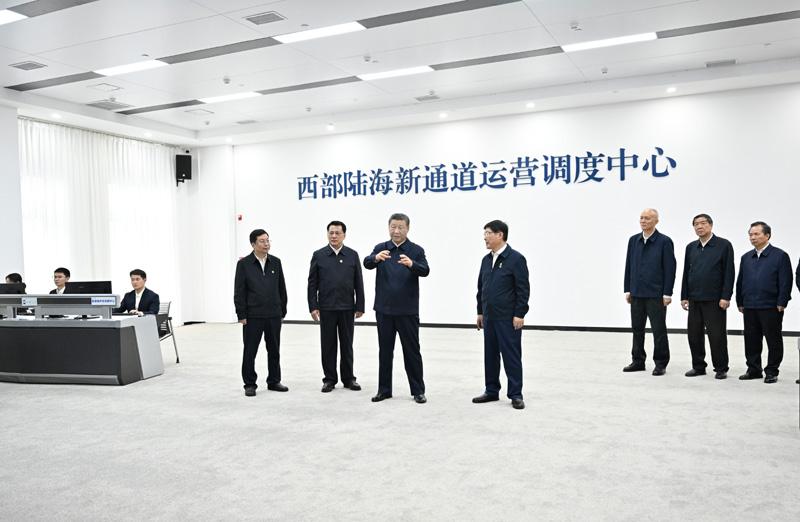
4月22日至24日,中共中央總書記、國家主席、中央軍委主席習近平在重慶考察。這是22日下午,習近平在重慶國際物流樞紐園區西部陸海新通道重慶無水港運營調度中心考察。新華社記者 岳月偉 攝
22日下午,習近平首先考察了重慶國際物流樞紐園區。他來到西部陸海新通道重慶無水港運營調度中心,聽取新通道建設情況彙報。習近平強調,物流是實體經濟的“筋絡”。建設西部陸海新通道,對於推動形成“陸海內外聯動、東西雙向互濟”的對外開放格局具有重要意義。各有關方面要齊心協力,把這一標誌性項目建設好、運營好,帶動西部和內陸地區高水準對外開放。物流園區要積極運用先進技術,不斷創新聯運模式,提高科學管理水準,在建設現代物流體系中發揮更大作用。
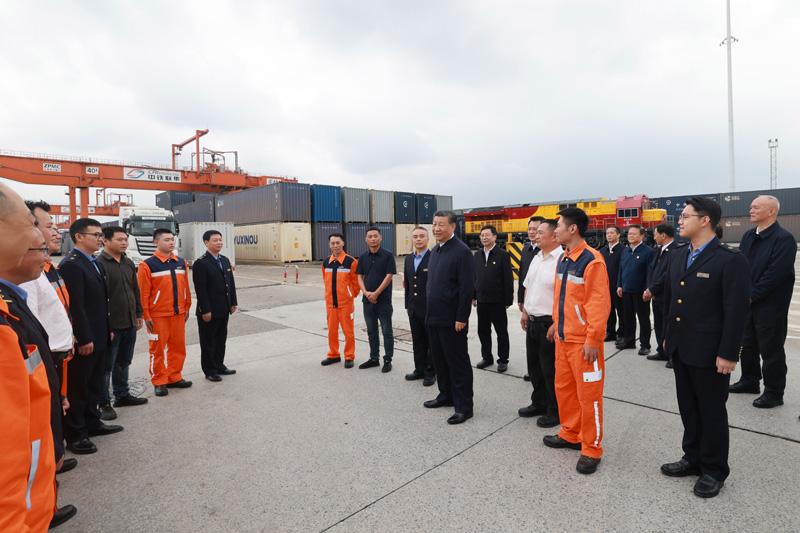
4月22日至24日,中共中央總書記、國家主席、中央軍委主席習近平在重慶考察。這是22日下午,習近平在重慶國際物流樞紐園區重慶鐵路集裝箱中心站,同貨車司機、列車司機、裝卸工人、場站管理人員等親切交流。新華社記者 王曄 攝
隨後,習近平來到重慶鐵路集裝箱中心站,聽取貨物集散、運輸路徑、運營成本和效益等介紹,同貨車司機、列車司機、裝卸工人、場站管理人員等親切交流,詢問他們的工作強度、勞動保護、節假日休息和收入情況。習近平説,大家在物流一線,也是在對外開放一線,通過你們的辛勤勞動,很多商品跨越山海、走向世界,你們的工作很有意義。推動西部大開放、促進西部大開發,物流很重要,大家要繼續努力,不斷創造新的業績,作出新的貢獻。

4月22日至24日,中共中央總書記、國家主席、中央軍委主席習近平在重慶考察。這是22日下午,習近平在重慶國際物流樞紐園區重慶鐵路集裝箱中心站,同貨車司機、列車司機、裝卸工人、場站管理人員等親切交流。新華社記者 王曄 攝
習近平還聽取了重慶推動成渝地區雙城經濟圈建設情況彙報,參觀了重慶科技創新和産業發展成果展示。習近平表示,建設成渝地區雙城經濟圈是黨中央作出的重大戰略決策。重慶、四川兩地要緊密合作,不斷提升發展能級,共同唱好新時代西部“雙城記”。支柱産業是發展新質生産力的主陣地。重慶的製造業有自身的結構特點、有相應的優勢,希望重慶牢牢抓住科技創新這個“牛鼻子”,揚優勢、補短板,抓當前、謀未來,堅定不移、久久為功,奮力推動製造業高品質發展。
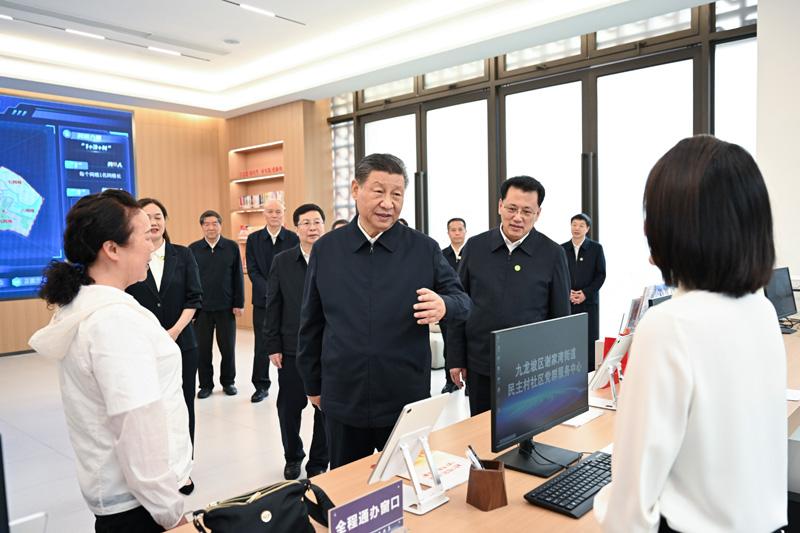
4月22日至24日,中共中央總書記、國家主席、中央軍委主席習近平在重慶考察。這是22日下午,習近平在九龍坡區謝家灣街道民主村社區考察。新華社記者 謝環馳 攝
九龍坡區謝家灣街道民主村社區是一個老小區,2022年初啟動更新改造項目並納入全國有關試點。習近平來到這裡,察看小區改造和便民服務情況,聽取提升基層治理效能、為基層減負情況介紹。他還走進社區食堂,同正在就餐的群眾親切交流,鼓勵社區食堂實現可持續發展。習近平指出,老舊小區改造是城市更新的一個重點,也是一項民生工程,既要保留歷史記憶和特色風貌,又要解決居民關切的實際問題。要總結推廣這方面的成功經驗,更好惠及廣大社區居民。城市治理的很多工作要靠基層黨組織這個戰鬥堡壘和社區這個平臺去落實,要厘清城市社區職責事項,繼續推動資源下沉、完善服務設施,強化網格化管理、資訊化支撐,提高社區精細化治理、精準化服務水準。
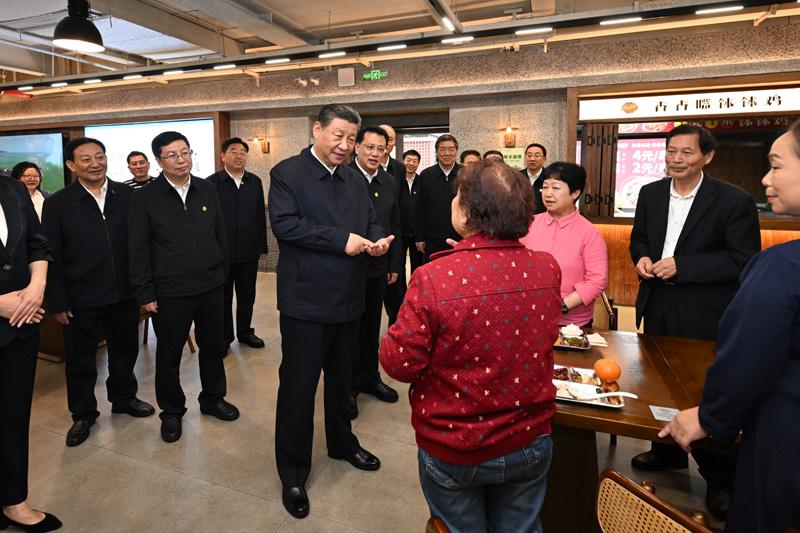
4月22日至24日,中共中央總書記、國家主席、中央軍委主席習近平在重慶考察。這是22日下午,習近平在九龍坡區謝家灣街道民主村社區考察時,同正在社區食堂就餐的群眾親切交流。新華社記者 謝環馳 攝
離開時,社區居民紛紛圍攏過來歡送總書記。習近平對大家説,中國式現代化,民生為大。黨和政府的一切工作,都是為了老百姓過上更加幸福的生活。希望各級黨委和政府都能為解決民生問題投入更多的財力物力,每年辦一些民生實事,不斷增強人民群眾的獲得感幸福感安全感。

4月22日至24日,中共中央總書記、國家主席、中央軍委主席習近平在重慶考察。這是22日下午,習近平在九龍坡區謝家灣街道民主村社區考察時,同社區居民親切交流。新華社記者 鞠鵬 攝
23日上午,習近平考察了重慶市數字化城市運作和治理中心,聽取當地加快城市數字化轉型、探索超大城市治理新路等情況彙報,觀看系統應用演示。習近平指出,治理體系和治理能力現代化是中國式現代化的應有之義。強化數字賦能、推進城市治理現代化,要科學規劃建設大數據平臺和網路系統,強化聯合指揮和各方協同,切實提高執行力。城市治理涉及方方面面,首要的是以“時時放心不下”的責任感,做好預案、精準管控、快速反應,有效處置各類事態,確保城市安全有序運作。希望你們不斷探索,積累新的經驗。

4月22日至24日,中共中央總書記、國家主席、中央軍委主席習近平在重慶考察。這是23日上午,習近平在重慶市數字化城市運作和治理中心考察。新華社記者 謝環馳 攝
24日上午,習近平聽取了重慶市委和市政府工作彙報,對重慶各項工作取得的成績給予肯定。
習近平指出,重慶製造業基礎較好,科教人才資源豐富,要著力構建以先進製造業為骨幹的現代化産業體系。深入實施製造業重大技術改造升級和大規模設備更新工程,加快傳統産業轉型升級,積極培育具有國際先進水準和競爭力的戰略性新興産業。加強重大科技攻關,強化科技創新和産業創新深度融合,積極培育新業態新模式新動能,因地制宜發展新質生産力。積極推進成渝地區雙城經濟圈建設,更好發揮全國高品質發展的重要增長極和新的動力源作用。大力推動綠色發展,建設美麗重慶,築牢長江上游重要生態屏障。

4月22日至24日,中共中央總書記、國家主席、中央軍委主席習近平在重慶考察。這是22日下午,習近平參觀重慶科技創新和産業發展成果展示。新華社記者 王曄 攝
習近平強調,重慶要以敢為人先的勇氣,全面深化改革,擴大高水準對外開放。堅持和落實“兩個毫不動搖”,一手抓深化國企改革、培育一批核心競爭力強的國有企業,一手抓促進民營經濟發展壯大、激發各類經營主體活力。積極融入全國統一大市場建設,主動融入和服務國家重大戰略,在推動共建“一帶一路”、長江經濟帶、西部陸海新通道聯動發展中發揮更大作用。主動對接高標準國際經貿規則,營造市場化法治化國際化一流營商環境。
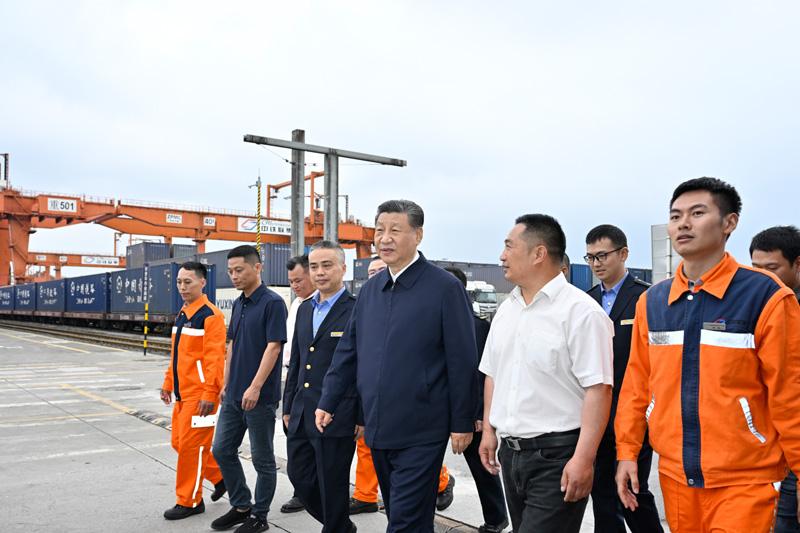
4月22日至24日,中共中央總書記、國家主席、中央軍委主席習近平在重慶考察。這是22日下午,習近平在重慶國際物流樞紐園區重慶鐵路集裝箱中心站,同貨車司機、列車司機、裝卸工人、場站管理人員等親切交流。新華社記者 岳月偉 攝
習近平指出,重慶是我國轄區面積和人口規模最大的城市,要深入踐行人民城市理念,積極探索超大城市現代化治理新路子。加快智慧城市建設步伐,構建城市運作和治理智慧中樞,建立健全“大綜合一體化”城市綜合治理體制機制,讓城市治理更智慧、更高效、更精準。紮實推進黨建引領基層治理,堅持和發展新時代“楓橋經驗”,深化城鄉精神文明建設,推進移風易俗,提高全社會文明程度。全面推進韌性城市建設,有效提升防災減災救災能力。
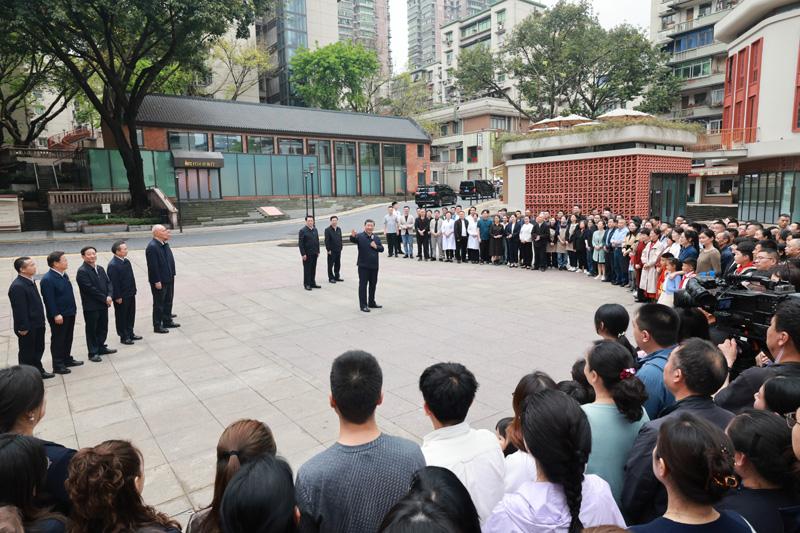
4月22日至24日,中共中央總書記、國家主席、中央軍委主席習近平在重慶考察。這是22日下午,習近平在九龍坡區謝家灣街道民主村社區考察時,同社區居民親切交流。新華社記者 王曄 攝
習近平強調,重慶集大城市、大農村、大山區、大庫區于一體,要大力推進城鄉融合發展。積極推進以縣(區)城為重要載體的新型城鎮化建設,有序引導、依法規範城市工商資本和科技、人才下鄉,助力鄉村全面振興。抓牢抓實糧食生産,依山就勢發展生態特色農業。學好用好“千萬工程”經驗,因地制宜開展鄉村建設,聚焦現階段農民群眾需求強烈、能抓得住、抓幾年就能見到成效的重點實事,抓一件成一件,讓農民群眾可感可及、得到實惠。鞏固拓展脫貧攻堅成果,確保不發生規模性返貧。
習近平指出,要毫不放鬆堅持黨的領導、加強黨的建設。鞏固拓展主題教育成果,建立健全長效機制,推動黨員、幹部特別是領導幹部增強政治能力、提高工作水準,真抓實幹、積極進取、擔當作為。持續深化整治形式主義為基層減負,為基層幹部幹事創業創造良好條件。紮實開展黨紀學習教育,引導黨員、幹部真正把紀律規矩轉化為政治自覺、思想自覺、行動自覺。一以貫之反對和懲治腐敗,不斷剷除腐敗滋生的土壤和條件,營造風清氣正的政治生態。
中共中央政治局常委、中央辦公廳主任蔡奇陪同考察。
李幹傑、何立峰及中央和國家機關有關部門負責同志陪同考察。
Xi calls on Chongqing to write its chapter in Chinese modernization
BEIJING, April 25 (Xinhua) -- Xi Jinping, Chinese president, general secretary of the Communist Party of China (CPC) Central Committee and chairman of the Central Military Commission, called on Chongqing to give full play to its comparative and late-mover advantages in line with the central tasks of the CPC on the new journey in the new era and its mission entrusted by the CPC Central Committee. The city should further reform and opening up across the board, proactively serve and integrate into the new development paradigm, and strive to promote high-quality development. By doing all these, it should try to build itself into a key strategic fulcrum for the development of China's western region in the new era and a comprehensive hub for inland opening up. The city is also urged to make greater achievements in playing its supporting role in the development of the western region, its leading role in promoting the progress of the Belt and Road Initiative, and its exemplary role in stimulating the green development of the Yangtze River Economic Belt, and thereby continuously write its own chapter in advancing Chinese modernization.
From April 22 to 24, accompanied by Yuan Jiajun, a member of the Political Bureau of the CPC Central Committee and the secretary of the CPC Chongqing Municipal Committee, and Hu Henghua, Chongqing's mayor, Xi inspected a logistics park, a community, the city's digital urban operation and governance center and other places.
On the afternoon of April 22, Xi first inspected the Chongqing International Logistics Hub Park. He came to the control center of the dry port of the New International Land-Sea Trade Corridor of the western region, learning about the construction progress of the corridor. Xi stressed that logistics is the lifeline of real economy. The construction of this corridor is of great significance to promoting the formation of an opening-up pattern featuring "building connections with other countries over land and sea while facilitating mutual assistance between eastern and western regions," he said. All related parties should make concerted efforts to do a good job in building and managing this signature project, so as to advance the high-level opening up in the western and inland regions, Xi said. He also urged logistic parks to actively leverage advanced technologies, continue innovating the multimodal transportation and improve scientific management level, so as to play a greater role in building the modern logistic system.
Later on, Xi came to a rail container hub in Chongqing, where he was briefed on situations of cargo distribution, transport routes, operating costs and returns, and chatted with truck drivers, train drivers, loading workers and management staff. He asked about their work load, labor protection, public holiday leaves and salaries. "You work at the frontline of the logistic sector as well as that of the opening up. Through your hard work, many goods are able to traverse the mountains and seas and enter the international markets," Xi said, stressing the importance of their work. He underscored the significance of logistics in promoting the greater openness and development of the western region, and encouraged workers to continue working hard, achieving new progress and making more contributions.
Xi also heard reports on the progress Chongqing made in promoting the development of the Chengdu-Chongqing economic circle and watched an exhibition on Chongqing's achievements of sci-tech innovation and industrial development. He underlined that building the Chengdu-Chongqing economic circle is a major strategic decision made by the CPC Central Committee. Chongqing and Sichuan should work closely, make consistent efforts to expand development capacity, and jointly strive for better results in building the "two cities" in western China in the new era, Xi noted. He highlighted the role of pillar industries as the main battlefield for developing new quality productive forces. Chongqing's manufacturing sector possesses distinct structural characteristics and corresponding advantages, Xi said, adding that Chongqing should firmly focus on technological innovation, leverage its advantages and strengthen weak links. The city should also do its current work well while planning for the future and persist in promoting the high-quality development of the manufacturing industry in a steady manner.
Minzhu Village Community in Xiejiawan Sub-district, Jiulongpo District, is an old residential area. A renovation project was launched in the community at the beginning of 2022, which has been included in national pilot programs. In the community, Xi learned about the progress of the community renovation and services offered for residents in the community. Xi was briefed on the progress in improving grassroots governance and reducing burden at the grassroots level. He visited the community canteen, where he chatted cordially with people dining there, encouraging the canteen to achieve sustainable development. Xi noted that as a major aspect of the urban renewal, renovation of old residential communities is a project that delivers real benefits to local people. In such renovation, historical structures and unique local characteristics should be preserved while efforts must be made to address practical concerns facing residents. It is important to summarize and promote experience in this regard to deliver more benefits to a larger number of community residents. Xi added that as grassroots Party organizations and communities play a key role in implementing many aspects of work of urban governance, it is necessary to clarify the remit of urban communities, continue to allocate resources down to communities and improve service facilities. Efforts should also be made to strengthen grid-based management and IT support, in a bid to facilitate the level of meticulous community governance and targeted services.
When Xi was leaving, residents of the community gathered to bid farewell to him. Xi told them: "As far as Chinese modernization is concerned, the people's well-being matters the most. All that the Party and government do is for the common people to live a happier life." Xi expressed the hope that Party committees and governments at all levels will invest more financial and material resources in solving problems for people's well-being, and do some practical things to improve people's life every year, so as to continuously enhance people's sense of gain, happiness and security.
On the morning of April 23, Xi visited Chongqing's digital urban operation and governance center, where he was briefed on local efforts to accelerate urban digital transformation and explore new ways for megacity governance, and watched the demonstration of system application. Xi pointed out that the modernization of governance system and capacity is an integral part of Chinese modernization. To strengthen digital empowerment and promote the modernization of urban governance, it is necessary to scientifically plan and build big data platforms and network systems, strengthen joint command and coordination among all parties, and effectively improve execution capacity. Urban governance involves many aspects; the first is to have a strong sense of responsibility to make plans in advance, render management and control accurate and targeted, ensure rapid response, and effectively deal with all kinds of conditions, so as to ensure the safe and orderly operation of the city. Xi hopes them to keep exploring and accumulate new experience.
On the morning of April 24, Xi listened to the report of CPC Chongqing Municipal Committee and Chongqing municipal government on their work, and affirmed what the city has achieved in various aspects of its work.
Xi noted that Chongqing's manufacturing sector has a solid foundation, and its talent resources in science and education is abundant. It is imperative for the city to build a modern industrial system with the advanced manufacturing sector as its backbone. Efforts are required to further promote the major technological transformation and upgrading of the manufacturing sector and the large-scale equipment renewals, speed up transforming and upgrading traditional industries, and foster strategic emerging industries with an advanced global level and competitiveness. It is essential to strengthen efforts to make major technological breakthroughs, integrate innovation in science and technology with that in industries, develop new business forms, models and growth drivers, and develop new quality productive forces according to local conditions. The building of the Chengdu-Chongqing economic circle should be further advanced, and its role as an important growth pole and a new source of power for promoting high-quality development nationwide should be better played. Green development should be further promoted to build a beautiful Chongqing and consolidate the ecological shields along the upper reaches of the Yangtze River.
Xi stressed that Chongqing, with a pioneering and enterprising spirit, should comprehensively deepen reform and expand high-level opening up. It must unswervingly consolidate and develop the public sector and unswervingly encourage, support and guide the development of the non-public sector. On one hand, reform on state-owned enterprises should be deepened, and a batch of state-owned enterprises with strong core competitiveness should be developed. On the other hand, the growth of the private sector should be facilitated, and the vitality of various business entities should be stimulated. Chongqing should proactively integrate itself into the development of a unified national market, take an active part in getting deeply integrated into and serving major national strategies, and play a greater role in promoting the development of the Belt and Road Initiative, the Yangtze River Economic Belt, and the New International Land-Sea Trade Corridor in the western region. Chongqing should also actively dovetail with high-standard international economic and trade rules to develop a first-class market-oriented and law-based international business environment.
Xi noted that Chongqing, as a city with the largest jurisdiction area and population in China, should fully act on the principle that a city should be built by the people and for the people, and actively explore a new path of modernization in megacity governance. It is important for Chongqing to speed up the development of a smart city, build a smart center for city operation and governance, and also establish and improve the "comprehensive and integrated" city governance system and mechanism, so as to make city governance smarter, more efficient and more targeted. It is imperative to guide community-level governance with Party building, adhere to and develop the "Fengqiao Model" in the new era, further cultural and ethical advancement, promote the transformation of outdated rural customs, and make the whole society more civil. It is also a must to promote the building of a resilient city in all aspects and effectively improve its capacity for disaster prevention, mitigation and relief.
Xi stressed that Chongqing should vigorously promote the integrated development of urban and rural areas as it is a megacity with a vast rural and mountainous area, and a reservoir area all in one. Xi called for more efforts to promote new urbanization with focus on county (district) seats, guide and regulate urban industrial and commercial capital, science and technology as well as professionals to serve rural areas in an orderly and law-based manner, so as to promote rural revitalization across the board. More efforts should be made in grain production, and agriculture with ecological characteristics should be developed by making full use of local conditions. It is important to learn from the experience of the Green Rural Revival Program, and promote rural development in light of specific circumstances. Efforts should be focused on important things that can be done with available resources, yield results in a couple of years and meet the urgent needs of villagers. By getting these things done one after another, perceptible and accessible benefits will be made for rural residents. What has been achieved in poverty alleviation should be consolidated and expanded, making sure that no large number of people will slip back into poverty.
Xi pointed out that CPC leadership must be upheld and Party building strengthened. It is imperative to consolidate and expand what has been achieved in the theoretical study program. A long-term mechanism should be established to promote the capability of Party members and officials, especially leading officials, to do political work and improve their competence, so that they will perform their duties in a down-to-earth manner and strive to make contributions. The fight against pointless formalities should be continued to ease burdens on those working at grassroots and create favorable conditions for primary-level officials to do their work well. Solid efforts should be made to carry out study programs on Party disciplines, guiding Party members and officials to truly turn political disciplines and rules into their awareness in political orientation, thinking, and action. Corruption should be consistently fought against and corrupt elements punished, and the breeding grounds and conditions for corruption should be constantly eliminated, in order to keep a clean political environment.
Cai Qi, a member of the Standing Committee of the Political Bureau of the CPC Central Committee and director of the General Office of the CPC Central Committee, accompanied Xi on the inspection tour.
Li Ganjie, He Lifeng and leading officials of relevant central Party and government departments were also on the inspection tour. ■

